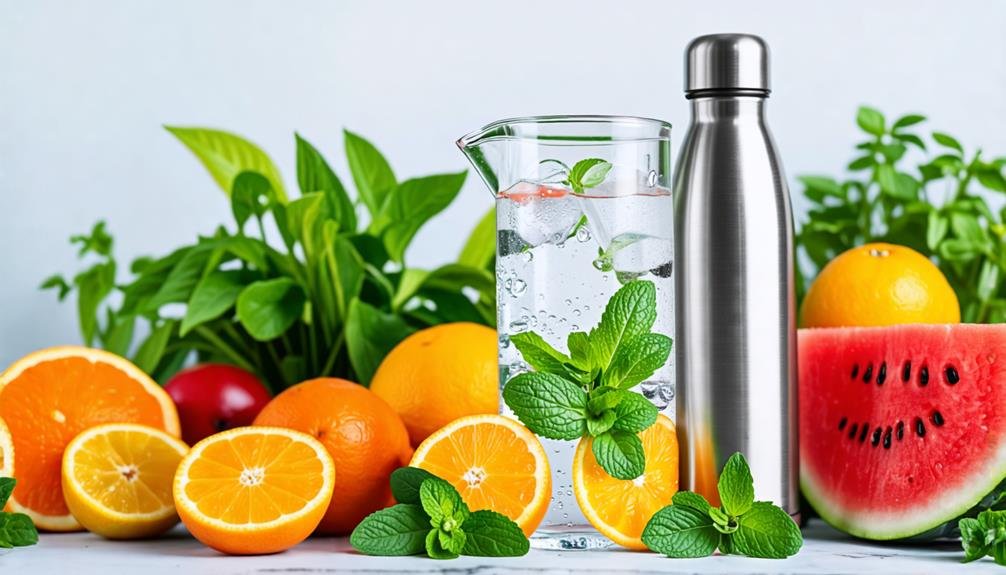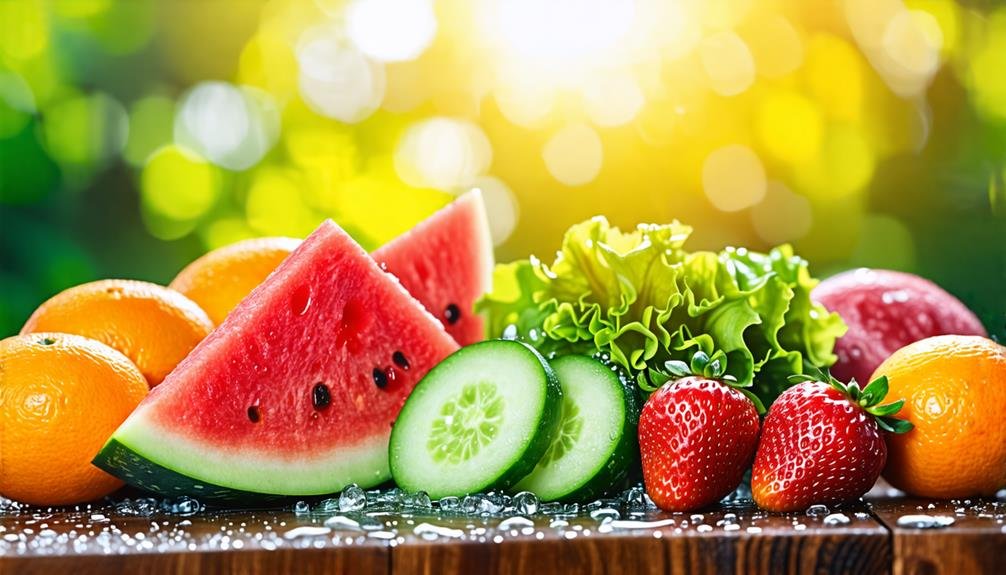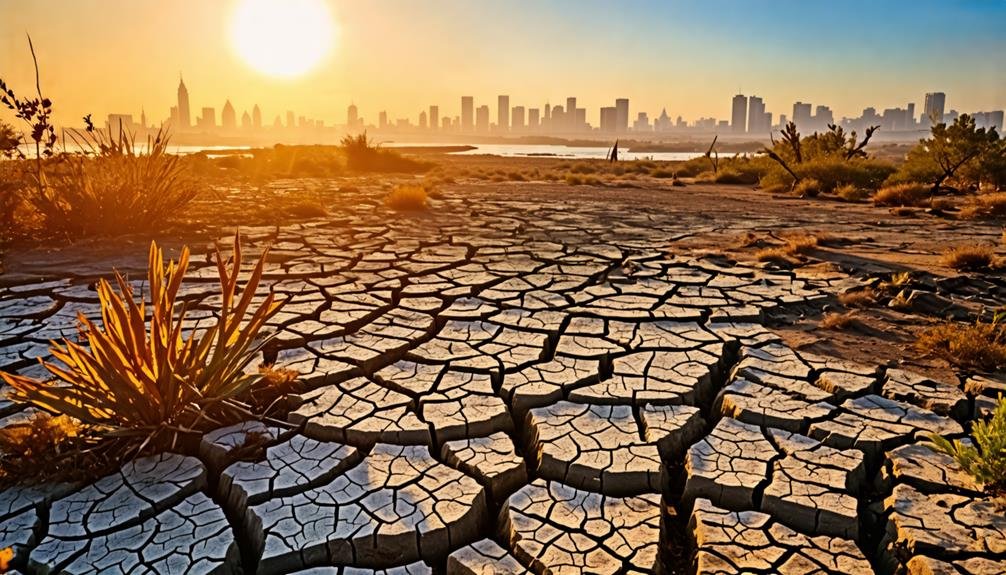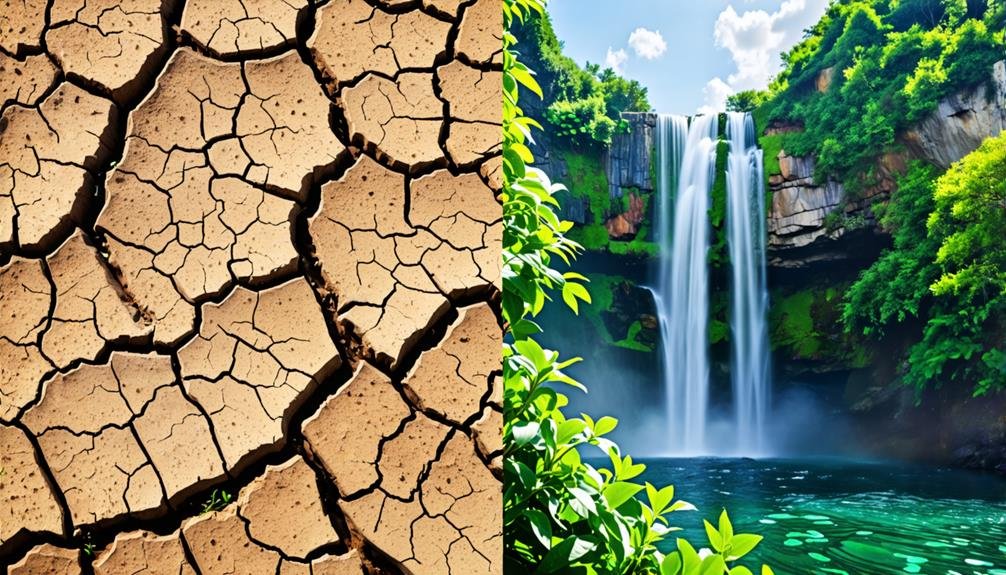Dehydration occurs when your body loses more fluids than it takes in, affecting both physical and mental health. Common signs include increased thirst, dry mouth, fatigue, and dark yellow urine. Physically, dehydration can lead to muscle fatigue, kidney issues, and cardiovascular strain. Mentally, it may cause irritability and cognitive decline. To prevent dehydration, drink water regularly, eat water-rich foods like cucumbers and watermelon, and consider electrolyte-rich snacks. Staying hydrated is crucial, especially in hot weather or during physical activities. Understanding these aspects helps maintain well-being, ensuring you feel your best under different circumstances. Further insights can enrich your hydration knowledge.
Signs and Symptoms of Dehydration
Recognizing the signs and symptoms of dehydration is crucial for maintaining optimal health and avoiding serious health complications. Early indicators include increased thirst, dark yellow urine, and a dry mouth. These symptoms signal that your body requires more fluids. As dehydration worsens, you may experience fatigue, headaches, and reduced urine output. It is vital to respond swiftly to prevent further dehydration consequences.
In more severe instances, symptoms can escalate to a rapid heartbeat, sunken eyes, confusion, and very dark urine. Identifying these warning signs is essential, particularly for individuals participating in outdoor activities such as hiking, where the risk of dehydration heightens. To ensure hiking safety, always carry ample water, such as bottled water from brands like Aquafina or Nestlé Pure Life, and take regular breaks to hydrate.
Physical Effects on the Body
Dehydration affects various bodily systems, leading to strain on the cardiovascular system, fatigue in muscles, and impairment of kidney function. When the body lacks adequate water, it struggles to carry out essential processes, which can detract from outdoor health and overall wellness. Recognizing these physical repercussions can help you prioritize hydration.
- Cardiovascular strain: Dehydration causes blood to thicken, compelling the heart to exert more effort, resulting in an increased heart rate and elevated blood pressure.
- Muscle fatigue: Diminished blood circulation to muscles can lead to weakness and reduced performance, making physical activities feel more challenging.
- Kidney function impairment: Lack of hydration hampers the kidneys' ability to regulate fluid and electrolyte balance, potentially resulting in kidney stones or infections.
Understanding these effects underscores the importance of maintaining hydration, particularly during outdoor activities. By consuming sufficient fluids, such as those from brands like Gatorade or Smartwater, you can help your body maintain its natural equilibrium, ensuring you feel invigorated and prepared for life's adventures. Make hydration a priority to protect your health and enhance your outdoor experiences.
Mental and Emotional Consequences

The effects of inadequate hydration reach beyond physical wellness, influencing mental and emotional states. When the body experiences a shortage of fluids, cognitive abilities can decline significantly. Tasks that require concentration, like studying for a university exam or working on a project, may become increasingly difficult. Even simple choices can seem daunting, and the ability to remember information may weaken.
Additionally, dehydration can trigger shifts in mood. People may experience feelings of irritability or anxiety without an apparent cause. This emotional fluctuation can strain connections with others, complicating interactions with friends and family. Severe tiredness and lack of energy often accompany dehydration, leading to a decrease in motivation and participation in enjoyable activities.
Maintaining proper hydration is essential for fostering a sharp mind and stable emotions. By consuming adequate quantities of water throughout the day, individuals can enhance their mental health and promote an overall sense of well-being. Remember, hydration is not solely about satisfying thirst; it involves nurturing a harmonious body and mind. Simple actions to encourage proper hydration can result in sharper focus, a better mood, and a more liberated experience in everyday life.
Recognizing Severe Dehydration
Severe dehydration presents critical signs that require urgent care, such as an elevated heart rate, sunken eyes, and confusion. Identifying these indicators is essential for ensuring safety and health. If you or someone nearby shows symptoms of severe dehydration, it is vital to seek medical assistance immediately.
Key signs of severe dehydration include:
- Elevated heart rate: The cardiovascular system strains to sustain blood circulation when fluid levels drop.
- Sunken eyes: This noticeable symptom indicates substantial water loss from the body.
- Confusion or irritability: Mental clarity may diminish, resulting in disorientation.
Grasping these symptoms can empower you to take timely action, safeguarding health and vitality. Remember, proper hydration is critical for maintaining physiological functions and overall wellness. If you observe these severe symptoms, act quickly to obtain the necessary assistance. By staying informed and attuned to your body's signals, you can better manage the challenges of dehydration and foster a healthier lifestyle.
Hydration Strategies for Daily Health

Effective hydration strategies are crucial for maintaining optimal health and improving overall well-being. Consuming at least eight glasses of water daily is a basic guideline. Utilizing a reusable water bottle, such as those from Hydro Flask or Nalgene, allows for convenient access, enabling you to hydrate consistently throughout the day. Additionally, integrating water-laden foods, like cucumbers and watermelon, can significantly aid in achieving your hydration targets.
Planning your hydration becomes especially important during outdoor activities, like hiking or running. Make it a habit to drink water regularly, instead of waiting until you experience thirst. This preventative measure helps to avert dehydration. Wearing suitable attire, such as moisture-wicking fabrics from brands like Under Armour or Nike, can also alleviate heat stress, particularly in warmer climates.
Electrolytes, found in beverages like Gatorade or Powerade, are vital for proper hydration. While we will delve deeper into this topic later, remember that consuming fruits, vegetables, and electrolyte-rich drinks during strenuous exercises can bolster your hydration efforts.
Creating a routine for hydration can profoundly influence your overall health. By emphasizing these strategies, you can foster good health while embracing an active lifestyle. It's essential to acknowledge that staying hydrated is not merely a choice; it's a crucial component of thriving well.
Importance of Electrolytes
Electrolytes serve a vital function in sustaining the body's fluid equilibrium, facilitating nerve impulses, and enabling muscle contractions. These essential minerals, such as sodium, potassium, calcium, and magnesium, are crucial for various bodily processes. Inadequate electrolyte levels can hinder your body's performance, especially during exercise or in high-temperature conditions.
To grasp the significance of electrolytes, consider their primary roles:
- Fluid Balance: They assist in preserving the appropriate fluid levels within and outside of cells.
- Nerve Communication: Electrolytes allow messages to flow between nerves, which is essential for overall bodily coordination.
- Muscle Activity: They are key to muscle contractions, including cardiac muscle, ensuring that the heart functions properly.
Integrating electrolytes into your daily diet can be straightforward with options like Gatorade, bananas, or electrolyte supplements like Nuun. By being mindful of your body's requirements and ensuring adequate electrolyte consumption, you can enhance your health and performance, helping you feel your best every day. A balanced strategy for hydration and nutrition is essential for your well-being.
Water-Rich Foods to Include

Including water-rich foods in your meals is a smart way to stay hydrated and promote overall wellness. Many fruits and vegetables are excellent for hydration due to their high moisture levels. For example, cucumbers, which contain about 95% water, are refreshing and adaptable. Watermelon, with around 92% water, is a tasty choice for hot days. Strawberries and cantaloupe also provide hydration, each containing roughly 91% water.
Leafy greens such as romaine lettuce and spinach not only hydrate but are also rich in essential vitamins and minerals. Bell peppers, which are composed of about 92% water, can be enjoyed both raw in salads or cooked in various dishes, enhancing flavor and nutrition. Greek yogurt is another great hydration source, containing approximately 85% water and offering beneficial probiotics for gut health.
Hydration During Outdoor Activities
Staying well-hydrated during outdoor activities is crucial for maintaining peak performance and preventing heat-related illnesses. Engaging in physical exertion under the sun can quickly lead to dehydration, which may hinder enjoyment and safety. To ensure you remain energized and focused, consider these hydration strategies:
- Sip regularly: Consume water or electrolyte drinks, such as Gatorade or Powerade, at intervals instead of waiting until thirst strikes.
- Check urine color: Light-colored urine indicates proper hydration, while dark yellow suggests a need for more fluids.
- Adjust for conditions: Increase fluid intake during hot, humid weather or intense activities, as these situations elevate hydration needs.
Climate Change and Dehydration Risks

As climate change leads to rising temperatures and more frequent heat waves, the risk of dehydration becomes a significant concern for everyone. Increased heat can exacerbate the body's need for hydration, making it crucial to recognize signs of dehydration and take proactive measures to stay hydrated. Moreover, incorporating nutritious foods that contain water and electrolytes can play an important role in preventing dehydration, helping to maintain general health even in challenging conditions.
Rising Temperatures Impact Hydration
Rising temperatures from climate change increase the risk of dehydration, highlighting the need for awareness and proactive hydration methods to protect health and performance. As global temperatures rise, people must recognize how these changes influence their hydration requirements.
To address this issue effectively, consider these strategies:
- Stay Informed: Follow local weather forecasts and understand how high heat affects your body.
- Hydrate Regularly: Drink brands like Aquafina or Dasani consistently, not just when you're thirsty, especially during hot days.
- Choose Revitalizing Foods: Add fruits and vegetables with high water content, such as cucumbers and watermelon, to your diet.
Heat Waves and Vulnerability
Heat waves increase the risk of dehydration, especially among vulnerable groups like senior citizens, children, and individuals with chronic health issues. During extreme heat events, the human body loses fluids quickly through perspiration, making hydration crucial. For example, an elderly individual may not sense thirst even when hydration is needed, which elevates their risk.
Additionally, children often engage in outdoor activities without recognizing their fluid loss, leading to potential dehydration. Those with chronic conditions might face challenges in maintaining proper hydration, as their bodies may not effectively manage heat stress.
As temperatures soar, it becomes critical to monitor hydration levels diligently. Encouraging consistent water consumption, even in the absence of thirst, can reduce risks. Simple tactics, such as staying cool and donning breathable fabrics, can enhance the body's heat management. By acknowledging these vulnerabilities, local communities can collaborate to educate and support each other, ensuring that everyone understands the significance of hydration during heat waves. With heightened awareness and proactive measures, we can effectively address the challenges posed by extreme heat and foster health and well-being.
Nutrition's Role in Prevention
Nutrition is vital for preventing dehydration, especially as global warming increases the dangers linked to extreme weather conditions. A balanced diet can significantly enhance hydration and overall health. Including particular foods and nutrients can mitigate the impacts of heat and support fluid equilibrium.
Consider these effective nutritional approaches:
- Hydrating Produce: Choose fruits and vegetables with high moisture content, such as Cucumis sativus (cucumbers), Citrullus lanatus (watermelon), and Citrus × sinensis (oranges).
- Electrolyte-Rich Foods: Incorporate potassium-rich foods like Musa (bananas), Spinacia oleracea (spinach), and dairy products like Chobani yogurt to restore essential minerals.
- Whole Grain Options: Select whole grain products, which provide dietary fiber and aid in digestive health, promoting better hydration.
Highlighting these dietary selections not only supports hydration but also enhances your body's ability to withstand climate-related stressors. By making educated nutritional choices, you can empower yourself to flourish, even in difficult situations. Remember, maintaining proper nutrition is key to preserving your health and preventing dehydration, enabling you to savor life to the fullest.




